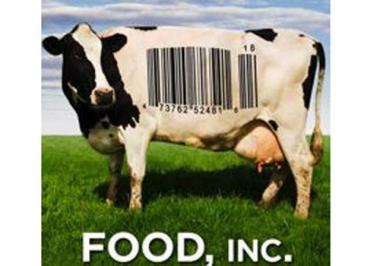The movie Food, Inc., produced by Robert Kenner and Eric Schlosser, author of Fast Food Nation, is recommended as a film to bring kids to, not just because it reveals the brutality behind seemingly innocent Chicken McNuggets, but because it is an object lesson on runaway capitalism: constant corporate growth can lead to E. coli contamination and in some cases, death.
In the first 10 minutes, the scene is set with the statement: "McDonald's is the largest purchaser of ground beef in the country." Because of this, meat production is determined by the company's buy-low-sell-high approach to food distribution, all sanctioned by the U.S. Department of Agriculture. This means that even if you don't eat fast food, you're eating fast food meat.
The ramifications of factory farming are illustrated with horrific footage of cruelty to animals and their handlers, leading to health hazards—in one case, the death of a small child. The movie ends with the question, "How can we get to the point where a head of cabbage is not more expensive than a hamburger?"
Last week, members of the food community in the Valley attempted to field that question and others. CISA (Community Involved in Sustaining Agriculture) and the publication Edible Pioneer Valley sponsored a screening of Food, Inc. at Amherst Cinema. The film was sold out; those who could not get in hung out in the lobby eating raw peas and chatting about food safety issues. After the film, panelists including Margaret Christie, Special Projects Director at CISA, Clarissa Coffin, the New England Director of American Farmland Trust, and Dan Kaplan, Farm Manager of Brookfield Farm in Amherst, took part in a dialogue with audience members.
One individual asked about chickens. The film noted that farmers working for Tyson must borrow an average of $500,000 to start a chicken farm. For their work on that farm they earn $18,000 a year. Although in Western Mass. one can raise and slaughter one's own chickens if local zoning allows it, larger-scale chicken production is difficult due to inspection regulations imposed by health departments in individual towns. Kaplan, of Brookfield Farm, outlined the current chicken situation in the Valley and recommended contacting the Department of Food and Agriculture for help in getting legislative support to make it more feasible to raise chickens for sale.
Much of the discussion had to do with the Food Bill of 2008, a $289 billion investment to "influence the cost of food and provide tools available to protect farm and ranchland," according to documentation provided by the Farmland Trust. A 15 percent allocation of the Food Bill appropriation provided payments to growers of wheat, cotton, rice, corn and soybeans. Coffin said that one of the challenges for smaller farmers is that fruits and veggies are considered specialty crops and often cannot be grown on farms that are receiving subsidies for other crops. She added that the Farmland Trust will continue to push for subsidy reform in future iterations of the Farm Bill.
On the specialty crops front, CSAs (Community Supported Agriculture farms) are doing a strong business in the Valley. Brookfield Farm is one of the nation's oldest CSAs. It began in 1987, around the time the Food Bank Farm of Hadley was established. Both CSAs have over 500 members and waiting lists. In response to a question from the audience about the viability of small farms, Kaplan said that "the market has completely swamped and overwhelmed us."
Brookfield is owned by the nonprofit Biodynamic Farmland Conservation Trust. Kaplan was hired 15 years ago as farm manager. He said that although there are lots of opportunities, farming in today's climate is risky business for people getting started.
"I think that there needs to be action on a local, state and federal level to create incentives for people to get into farming," he said later in an email. "I also think there is an important role for private individuals with either access to land or capital to create opportunities for young farmers. But these will take time to create, so I don't think this is a viable thing to offer now as a chance for people to find work in this current economic mess."
As for the rest of the $289 billion Food Bill, over 65 percent of the funding is allocated to anti-hunger programs. Andrew Morehouse, executive director of the Food Bank of Western Massachusetts in Hatfield, who was not at the screening, says the Food Bill of 2008 significantly increased support for food stamps (now called the Supplemental Nutrition Assistance Program, or SNAP), which provides purchasing power for food to income-eligible families (including families with children, working families, seniors) based on their income, family size, and other factors.
The movie wraps things up with the following directive: the best way to change the food industry is through policy. Food Bank's mission, in part, involves influencing local, state and national policy. Morehouse said that "public health, land stewardship and economic development could benefit from subsidized fruit and vegetable production on small farms," with a decrease in subsidy for traditional commodity crops, especially cotton (non-food) grown on large (corporate) farms. This could be recommended when the Food Bill next comes up for a vote.
Ultimately, Americans will vote with their dollars, and the rallying cry of food activists is that we vote three times a day by buying locally. That's fine if you can afford it. If not, you're voting for fast food.
Locavore Dogs: Coming soon to a festival near you
On Friday and Saturday, July 17 and 18, the Green River Festival 2009 at Greenfield Community College will feature performers Chris Smithers, The Winterpills, Sharon Jones and the Dap-Kings as well as kimchee hot dogs. According to Hope and Olive chef/owner Maggie Zaccaro, kimchee hot dogs are very hot in NYC. At Green River Fest, Hope and Olive will be selling local dogs made with pork raised on Bostrom Farm as well as burgers made with local beef. The kimchee, a Korean staple that has the nation buzzing about the health benefits of natural fermentation, will be provided by Dan Rosenberg and his partner Addie Rose Holland of Real Pickles, based in Montague.



